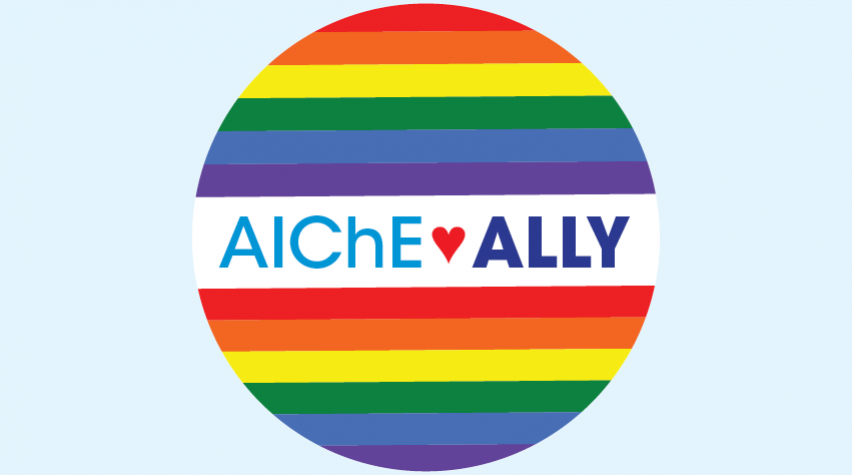
June is Pride Month and for the first time ever AIChE is offering you a chance to share your allyship with the AIChE Engage community. No matter how you fit into the LGBTQ+ community — whether you're an out engineer, identify as LGBTQ+, or an ally looking to share support during pride month — we invite you to claim your ally pride badge and show how we're all allies to one another in this community.
How does it work?
Clicking on the Show Your Pride link below will bring you to the AIChE Engage site. You’ll have to log in with your AIChE credentials. Once you do, you’ll see an orange button to the right that says “Join Community.” Click on that to opt-in and claim your ribbon and badge.
Where will your badge show?
You’re pride ribbon and badge will appear in your profile, the former on the left side of your profile and the latter under the “My Contributions” tab and “Achievements” drop down.
Opting out
We invite you to show your pride allyship all year long but if you’d like to opt out, you can do so. Click the link below to learn more.
Show your pride
Join AIChE's LGBTQ+ & Allies Online Community
This community is open to professional AIChE members who are LGBTQ+ and allies. Topics of discussion will include the ongoing development of LGBTQ+ initiatives within AIChE, plus issues concerning, and opportunities for, LGBTQ+ chemical engineering professionals.
Learn more about the community.
This initiative is supported by the AIChE Foundation's Doing a World of Good Campaign.
AIChE Foundation – All for Good Campaign

Learn more about AIChE's Diversity and Inclusion Initiatives.
Interested in helping?
Are you an LGBTQ+ chemical engineer and AIChE member interested in sharing your story to help create awareness around diversity and inclusion? Are you an LGBTQ+ ally interested in helping with diversity and inclusion efforts? Send us a note at chenected@aiche.org with the subject "Diversity and Inclusion."



Comments
I fail to see what AIChE's June promotion has to do with excellence in any aspect of the chemical engineering profession. Please, please, maintain your mission to promote the profession and not some SJW cause.
Thank you for sharing your concern about AIChE’s LGBTQ+ and Allies initiative. I’m sorry that you don’t share the opinion held by many AIChE leaders, that this is an important addition to the Institute’s commitment to expanding many aspects of equity, diversity and inclusion in the profession and among our membership. A number of studies have shown that STEM careers attract fewer gay, lesbian, bisexual and transgender people than should be expected given representation in the population. Additionally, those who do enter engineering often face particularly acute biases. To cope, many gays and lesbians suppress crucial aspects of their personalities and compartmentalize their lives, not bringing their full talents and selves to their jobs. The results can include measurably lower levels of job satisfaction and a reputation for a discipline as unwelcoming. Ultimately this translates to a loss of talent. In March 2020, AIChE’s Board has endorsed and published a new equity, diversity, and inclusion statement, which all members are encouraged to read and embrace.
Hello Mr. Brady. I can understand that you fail to see the connection, and know it can be difficult, but right there in your appeal to “promote the profession” is implied the need to invite young engineers into the profession, and retain them. Historically, engineering has been a hostile field for many groups, not only LGBTQ+ folks. The literature shows that LGBTQ+ engineers face unnecessary hurdles to becoming (and remaining) engineers. Even putting ethics aside, this status quo is simply wasteful process design, designed to purposefully pump valuable resources into competing professions. And, regardless, we cannot ignore our shared code of professional ethics (https://www.aiche.org/about/code-ethics). These efforts to remedy that lingering hostility for all groups are square in the middle of the responsibilities of AIChE. I am very grateful our leadership are working to help us all hire and work with the best talent. Such efforts to include and strengthen all our chemical engineering colleagues help us all to become better engineers and better people.
I agree with the above two comments from Stephanie and Anthony. Excellence in the ChE profession comes from innovation; and diversity & inclusion drive innovation, as supported by an ever-growing list of studies. I'm excited about this ally pride badge promotion, and just added one to my own AIChE Engage profile. I'm hoping other folks will see my badge and race to get their own! It's a creative and fun way to make the AIChE community more friendly to LGBTQ+ members. These types of intentional programs are what's required to change the norm in our profession--I'm glad to see AIChE acting on the commitment to promote equity!
Since the 1970's, universities with STEM programs have been bringing bus loads of high school students from what they believe are under-represented groups in their STEM programs for summer experiences in the sciences. These programs can last from one week to the entire summer. The programs are open to many at no or very low cost and accept many individuals in the targeted group. This is an effort that has been going on for almost 50 years. In addition to these university efforts there have been a myriad of outreach programs, targeted scholarship programs, and preferential enrollment opportunities. Today there are public and private initiatives focusing on these same efforts. It seems like I can't turn on the TV without seeing a Public Service Announcement encouraging selection of a STEM (or now STEAM) field for these same targeted groups. These recruitment efforts have been expanded even further as every major university and many corporations employ a Diversity and Inclusion Officer and staff focusing full-time on these activities. Nowadays, opportunities for STEM education and employment are available to everyone. Arguably, one can put him/herself through a STEM university program with little to no debt., This requires commitment, determination, and acceptance of delayed gratification. It may involve a year or two of community college followed by time at a state university along with part time, or preferably full time, employment throughout the year. Individuals that make this difficult choice are the people we want designing, constructing, operating and maintaining our nation’s refinery and chemical facilities. They have shown initiative, a desire to excel and perseverance. In conclusion, AIChE's efforts on this forefront seem to be one among hundreds or thousands of similar efforts. In the private sector results matter. The Institute is choosing to expend member funds to address this area of concern and yet it seems the desired results are not being achieved. If the Institute is interested in making the profession more diverse, something needs to change if past efforts have been interpreted as not working. Not everyone wants to be in the STEM field. Not everyone wants to work on technical problems and processes in the CPI. Not everyone is cut out to do so or has the interest or desire. After 50 years of outreach efforts it appears that nothing is going to change from the outside in to these targeted underrepresented groups, change will need to occur from within those groups.
I'm left a bit confused then, Mr. Brady. Efforts such as those on this page are meant to do just that, change the profession from within. And a lot has demonstrably changed over 50 years, even over 30 years (https://www.nsf.gov/statistics/2018/nsb20181/figures/fig03-28). The recruitment efforts you seem to take as ineffectual (?) correlate with greater minority involvement in STEM; it doesn't seem unreasonable to make a causal connection between inviting a person into a profession, welcoming them, and them deciding to give it a shot. Anecdotal, but I do a lot of K-12 outreach and have recruited many students who will tell you they became chemical engineers I showed up at their high school one day. Then I'm left trying to understand how saying something obvious like "Not everyone wants to be in the STEM field" relates to this in your thinking. I'm saying a person's potential to become an engineer is not dependent on their minority status, but the system, for them, to become an engineer adds extra hurdles. That is what I'm saying is contrary to our professional ethics. I don't think anyone is claiming the entirety of humanity should even want be in a STEM field, but, if a person wants that, we should all welcome them in and they should have a fair shot.